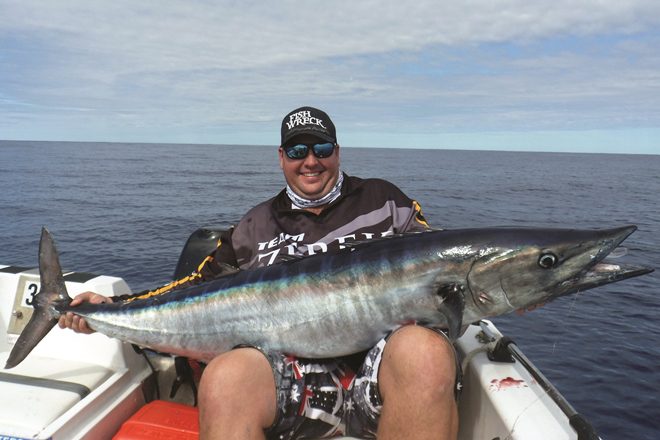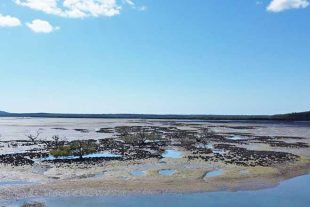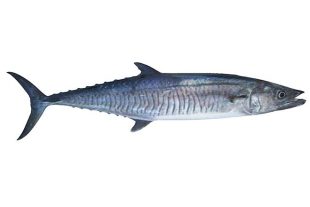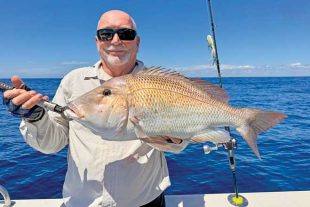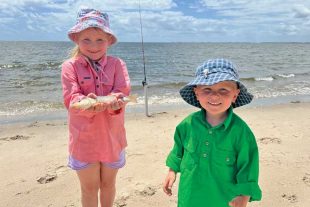WE were recently invited by Wilson Fishing on an exploratory field testing fishing expedition aboard James McVeigh’s Big Cat Reality Charters to the remote location of Wreck Reefs.
We had pretty simple instructions: catch plenty of fish, take plenty of photos and capture lots of footage. This particular fishing expedition would be a great opportunity to test out some of Wilson’s prototype Venom rods and Zerek lures as well as their braids, leaders and terminal tackle.
With a career of mostly freshwater fishing escapades under our belts, we were immediately up for the challenge. A nine-day fishing adventure with no phone or internet coverage – just us, the ocean and what lay beneath. It sounded almost too good to be true.
Wreck Reefs is a series of reefs located in the southern part of the Coral Sea island group. These reefs are aptly named after their collection of shipwrecks, with the most notorious being when Matthew Flinders was aboard the HMS Porpoise and both it and the HMS Cato ran aground on August 17, 1803. The Cato wreck gave its name to nearby Cato Reef. Wreck Reefs is made up of three cays: Bird Islet, Porpoise Cay and West Islet, all of which provide insane fishing opportunities around sand and coral islands.
Our journey began at Bundaberg Port Marina, where Big Cat Reality calls home. After several hours of packing a good tonne of gear onto the boat and meeting the crew and fellow fishers, it was time for a feed and a briefing about the adventure ahead. A 36-hour steam lay ahead of us, which would see us end up 450-500km offshore. Reports of fairly ordinary weather and rough seas were pretty spot on and we started off the trip steaming into a 20-25 knot wind.
With a fairly ordinary trip out and a few chucks over the back of the boat, the thought of our feet embedded in the sand on a Wreck Reefs beach made for a desert-like mirage on the far horizon! The TV lounge was the best place to be for the journey out and there weren’t many spare seats. Nick and Andrew Hart from the hit TV show Hook, Line and Sinker were along for the trip as was their cameraman Mike. The trip will soon feature on the new season of the show, so stay tuned to 7mate. The guys captured amazing footage while fishing in the Wilson boat with Troy Dixon and Graeme Wilson and also got great material filming on the beach.
On the Friday morning, we awoke to the sound of the anchor dropping at our first destination, West Islet. This is the closest section of Wreck Reefs to the mainland. The view that greeted us as we rose from the dorms was somewhat amazing. The wind had died down and the clarity and colour of the water with a sandy island in the background was simply breathtaking. It sure made that dream trip to the Maldives drop to the bottom of the bucket list.
The Big Cat’s very efficient crew wasted no time at all in hoisting five of the six poly tenders off the top deck of the boat and into the water, along with the 6m Wilson fishing vessel. The 4.2m dories had recently been fitted with brand-new 50hp Mercury four-strokes and they provided a great way of exploring the whole area. Even when the weather blows up, they handle it with ease. The dories are fitted out with the latest touchscreen Simrad sounders, which are a must out there when trying to figure out your plan of attack. Each tender has plenty of space for your gear and a large number of rod holders (you’ll need a few different setups). Each is also equipped with a VHF radio to enable communications between the tenders and mother ship at all times.
With conditions still not fully calm, we decided to troll first and it paid off for everyone. We hadn’t trolled even a couple of hundred metres and the barracuda were demolishing our lures. The airwaves were soon filled with excitement as each tender reported what they were hooked up to or had landed or how they were getting smoked.
Land-based options at Wreck
Besides the endless waters to navigate and fish in the dories around Wreck, the land-based fishing is a great alternative for those looking to give the sea legs a rest. Bird Islet, at the eastern end of the reefs, is flourishing with nature. To have the opportunity to wander around these truly offshore islands is really something special. From its extensive birdlife population to its huge colonies of hermit crabs and moray eels, you’ll find yourself relaxed and enjoying a piece of history that hasn’t been altered or ruined by mankind.
We had a blast fishing for GTs off the beach on Bird Islet where we landed quality fish up to about 15kg and were dusted up by plenty of bigger fish that were reluctant to give up the fight. Using the PE8 and PE10 Venom Popping rods matched with a couple of prototype ATC 10,000 spin reels that were recently released at the Australian Fishing Trade Association Trade Show, we chucked the Zerek Zappelin stickbaits in the 160mm and 220mm sizes with great success. The standout Zappelin colours for us were colour 1, colour 2 and GFF.
Fish species at Wreck Reefs
At Wreck you can expect to come across the following species:giant trevally, dogtooth tuna, yellowfin tuna, mack tuna, barracuda, coral trout, green jobfish, sailfish, marlin, wahoo, amberjack … and the list goes on. If you’re keen for a bait fish off the Big Cat at night-time, be prepared to deal with some decent-sized reef sharks as well as jobbies and bass. The sharks will also be very welcoming when you are landing fish in the dories during the day.
About the Big Cat
The Big Cat or ‘mother ship’ is a 26m x 10m steel catamaran originally built as a support ship for marlin fishing boats off Cairns. Built in Cairns under the name Coral Seatel in 1973, the vessel was made famous by its record marlin captures and was host to movie star Lee Marvin back in the early ‘80s. James and Donelle McVeigh acquired the Coral Seatel in 2001 and it was from here the Big Cat was born. James has been in the marine game for over 30 years and it’s safe to say he’s just about seen it all. His extensive knowledge and history in the industry certainly shines through with the operation of Big Cat Reality Fishing Charters. He has owned and operated charter boats out of numerous Queensland ports and has been heavily involved with maritime training and inspections in just about every port on the Queensland coast.
The Big Cat was mainly used as a scuba diving charter and maritime training vessel up until the last couple of years when the Big Cat Reality Fishing Charters operation evolved. In conjunction with Wilson Fishing’s extensive fishing knowledge, James has brought his extensive maritime experience to form a first-class operation. Big Cat Reality is a family owned and operated business by James, Donelle and their three kids, who we’re sure will walk in James’s footsteps.
The ship, which is a registered class 1B passenger vessel, weighs about 164 tonnes and is driven by two Caterpillar 3406B diesel engines that also drive the vessel’s 50kVA and 80kVA generators. She steams along at about nine knots in good conditions. On the top deck she’s equipped with a two-tonne hydraulic crane that is used to lift the dories, other boats and any heavy supplies on board.
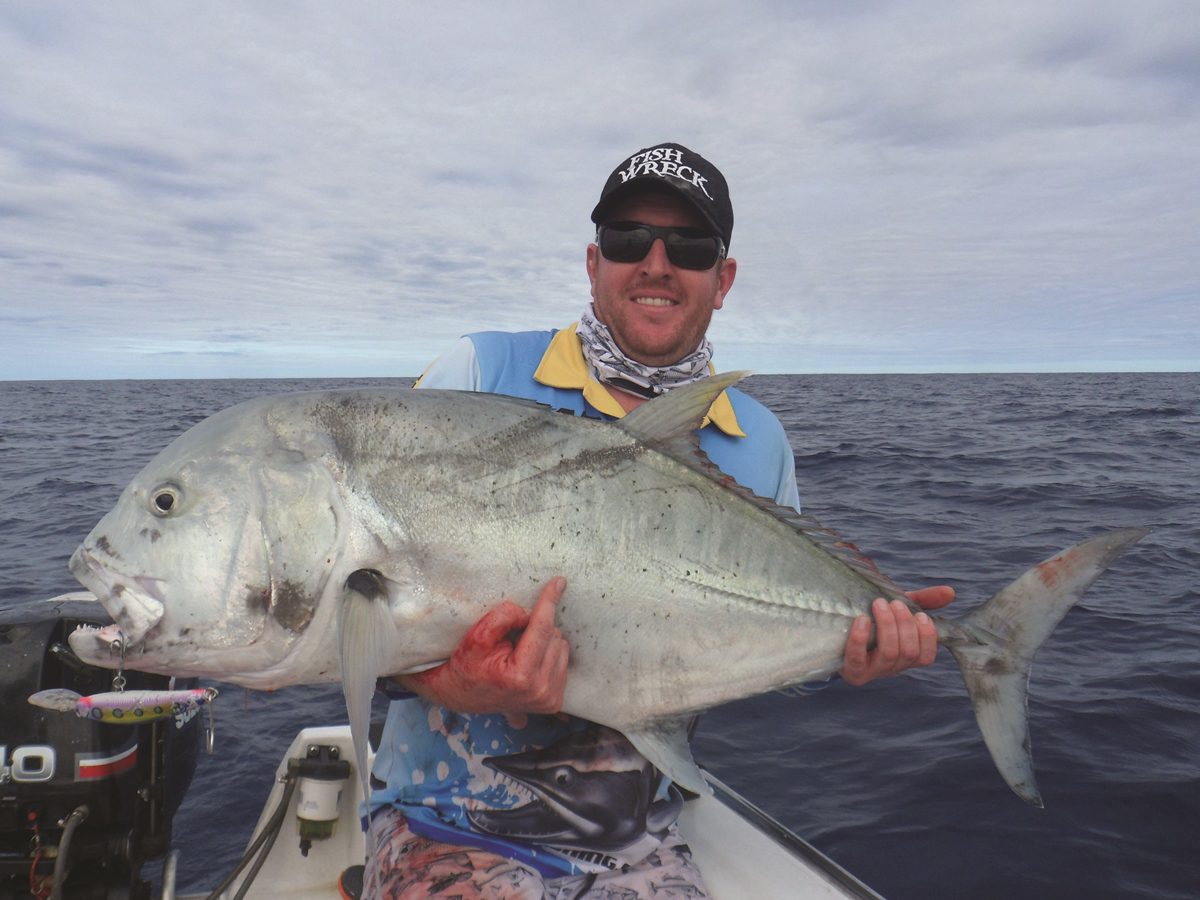
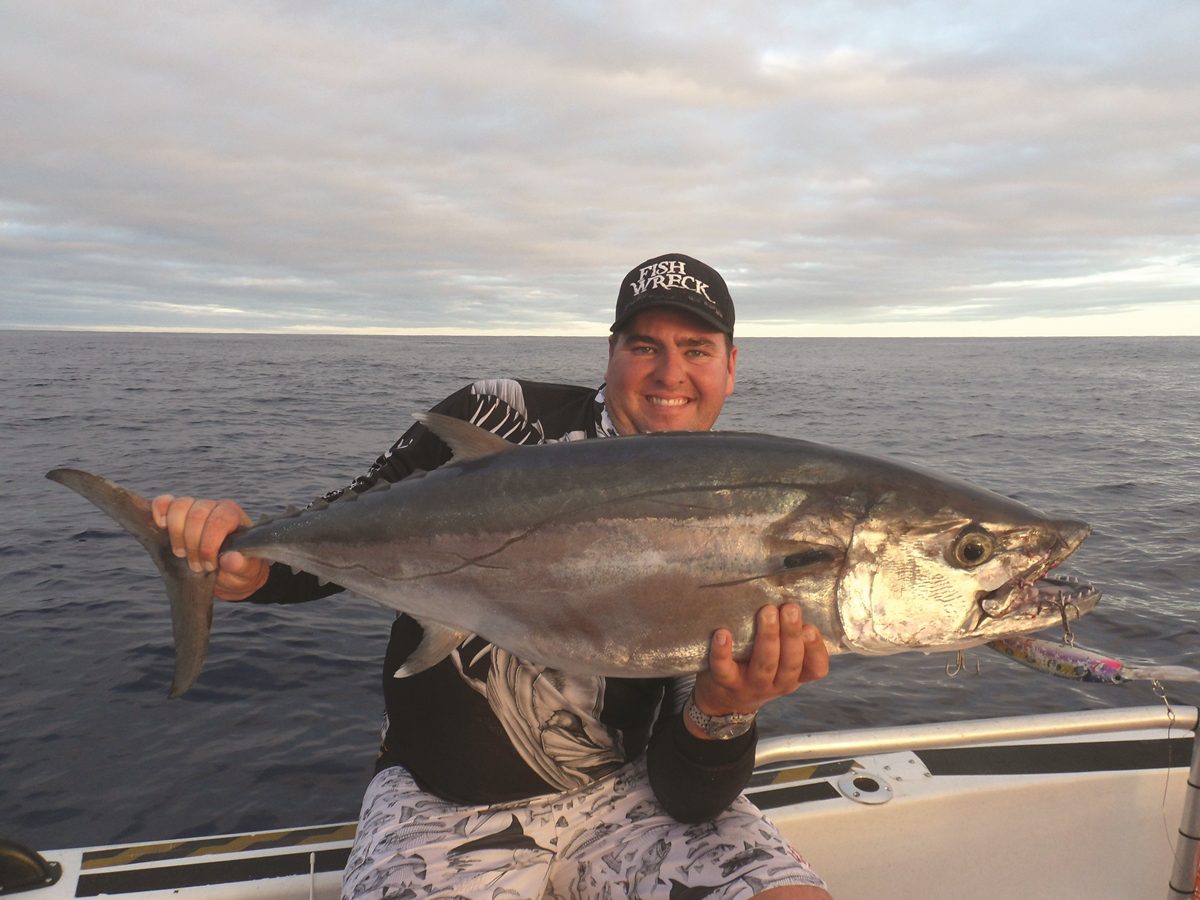

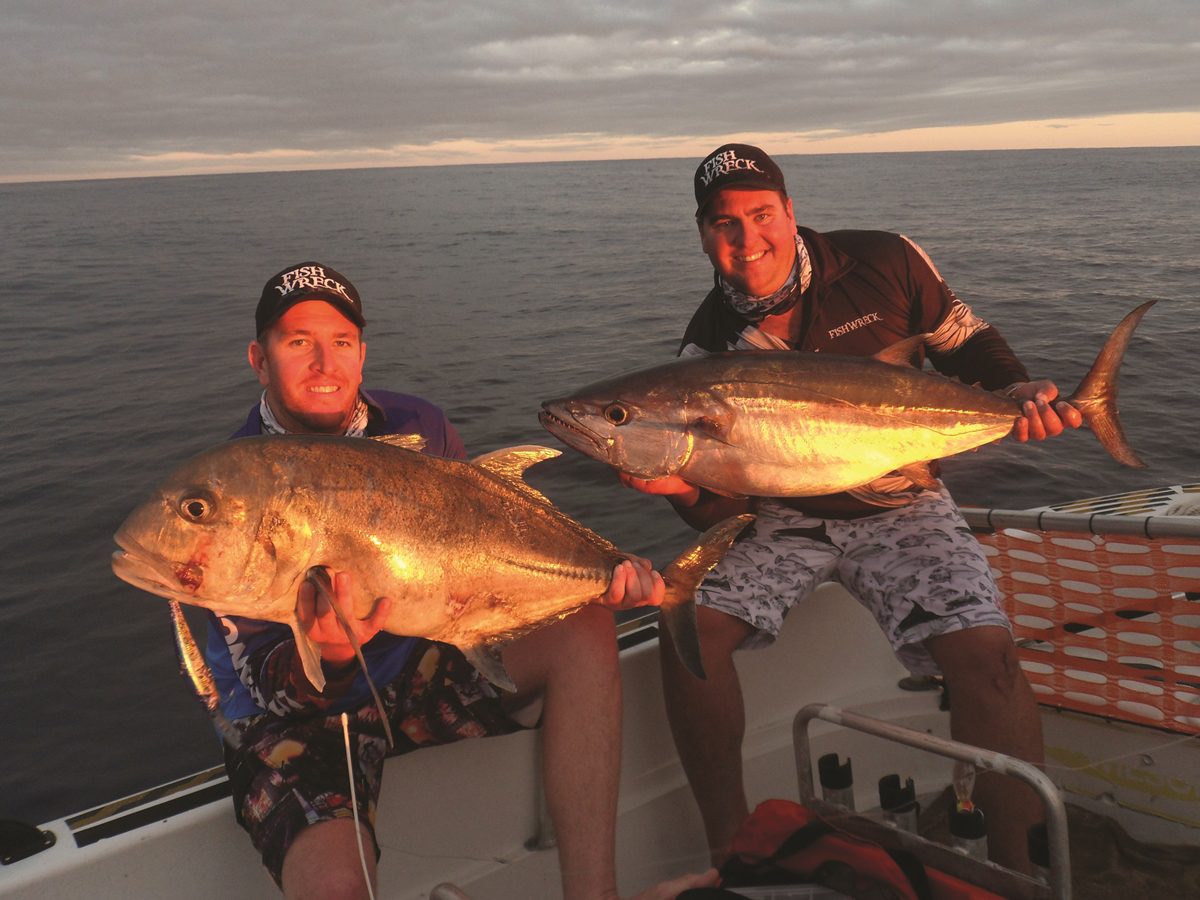
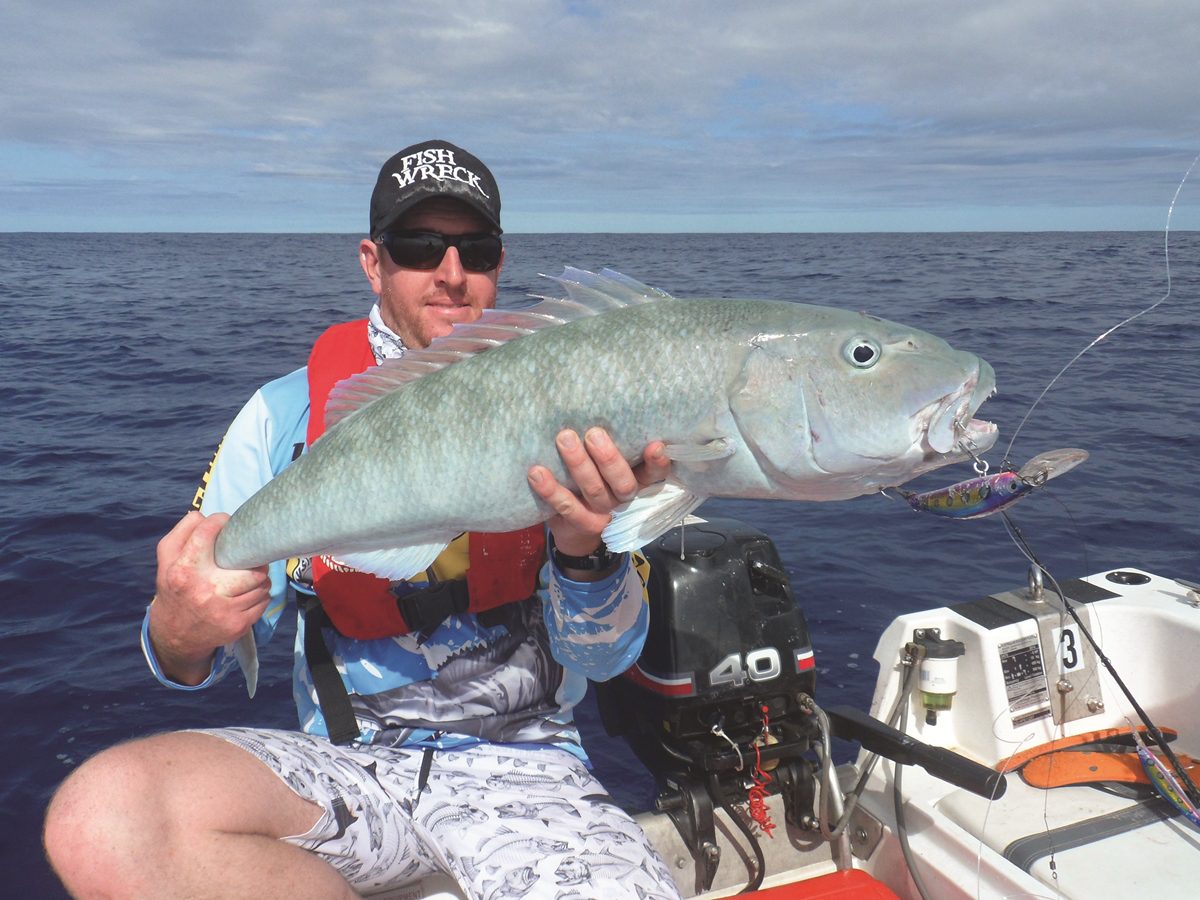
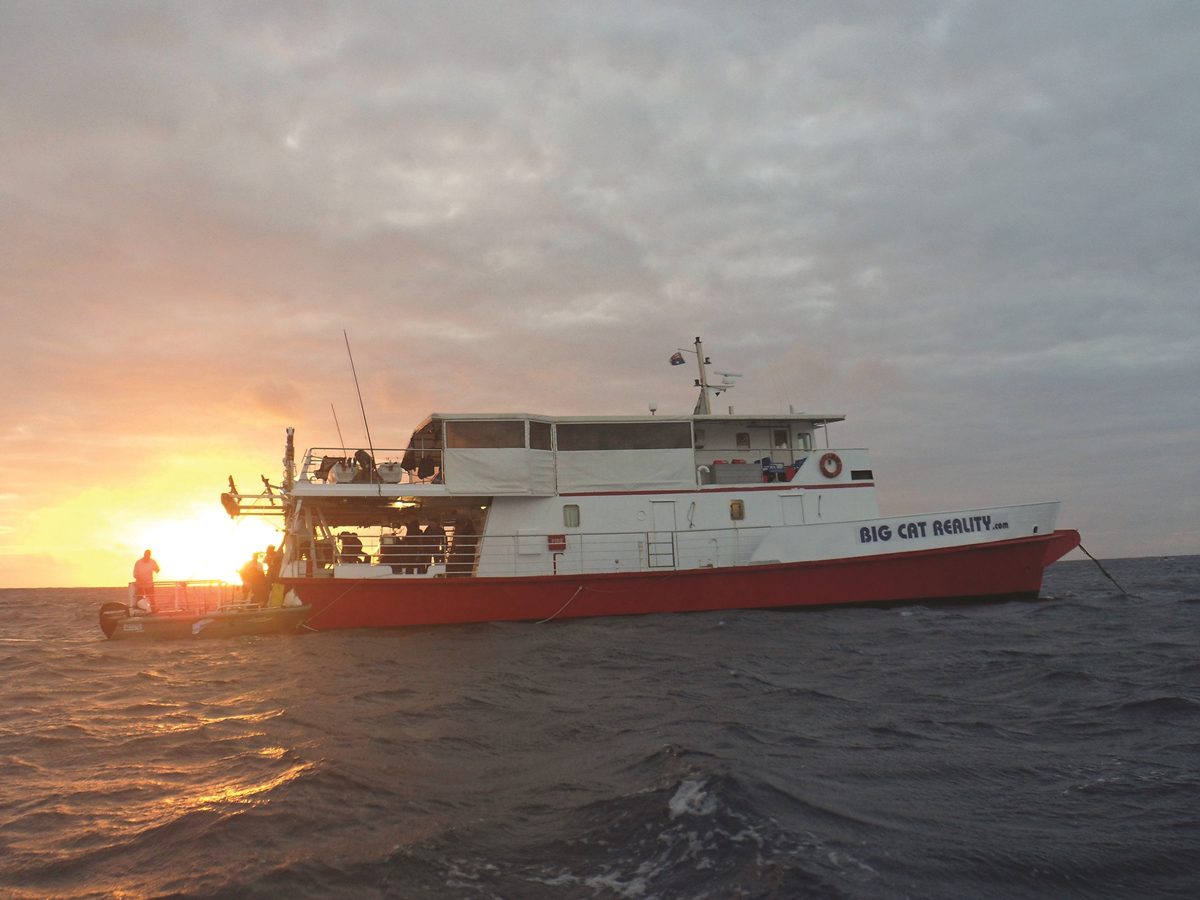



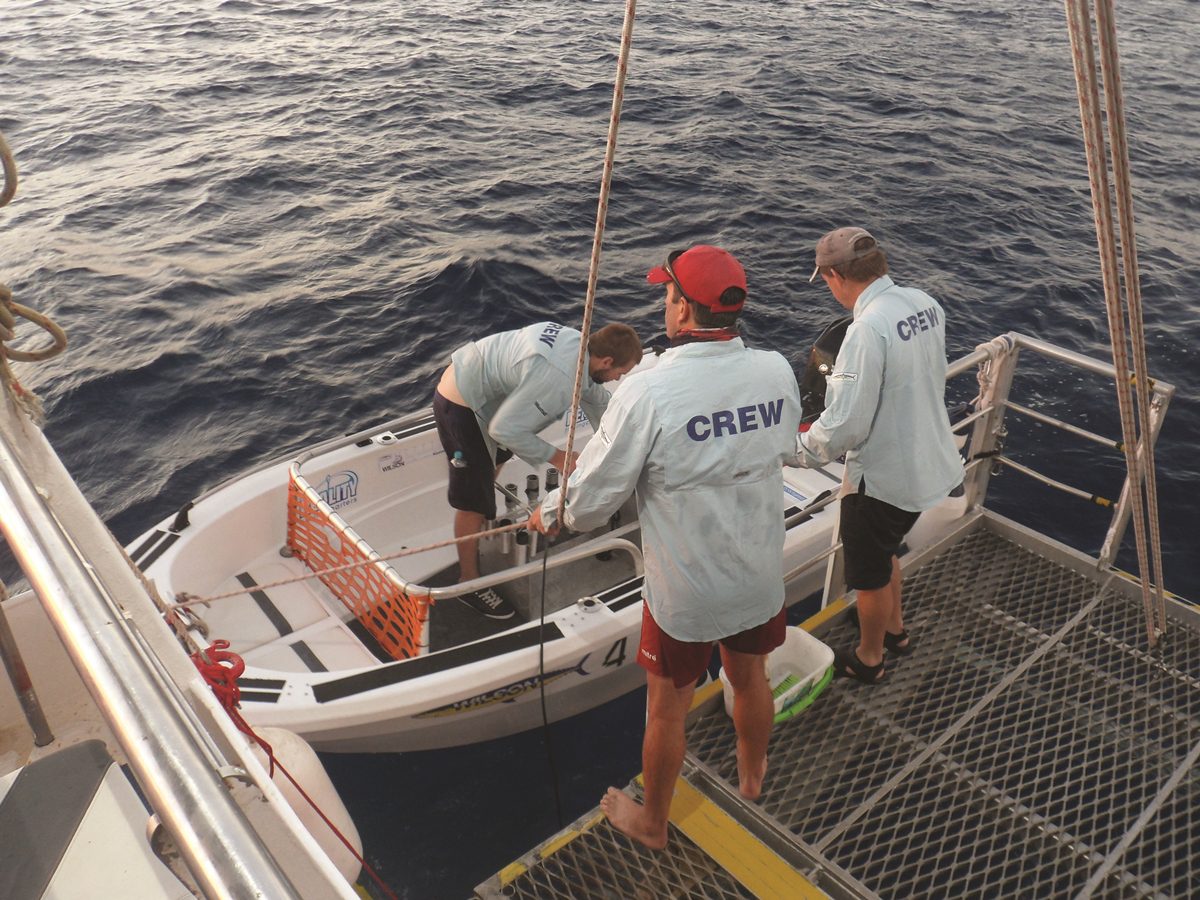

Upstairs on the bridge, she’s equipped with all the latest electronic equipment such as a 64 nautical mile Furuno radar, two Furuno GPS receivers, Nobeltec navigation system, two Simrad DSC VHF radios, a satellite phone, Simrad sounders and TMQ autopilot. James constantly stays one step ahead of the weather, streaming weather reports via satellite, and can give you a fairly accurate reading for the next couple of days. The below-deck dorms sleep up to 24 people with 12 a side and the crew quarters behind the bridge sleeps four.
There’s plenty of room in the bunks for all your gear and also power points conveniently placed in a compartment to keep your cameras, phones and laptops charged throughout the trip. You’re going to use these fairly regularly. The dorms also have air conditioning, just to make it that little bit more comfortable. The ship is of course equipped with plenty of showers and toilets.
Hospitality at its finest
There’s no need for fine dining in fancy restaurants when you spend nine days with chef Henry on the job. You will not go hungry with three big meals a day, and let’s not forget the dessert. If you’re on a diet or planning one, maybe just hold off for nine days. There’s always plenty of fruit and bottles of water and soft drink available as well.
Of a night, the top deck is converted into a dining room for everyone to share their stories from the day, and the energy and excitement at this time is unreal. James will also grab your SD cards and upload a heap of photos to show on the big screen while you’re having dinner and a laugh. It really is a great atmosphere. In terms of alcohol, the Big Cat has a licensed bar and cash/credit card facilities are provided as is a bar tab system. From the moment you climb aboard at Bundaberg, you are treated like royalty.
The only thing you really have to worry about on this trip is getting your fishing gear sorted and catching fish. In some cases, these big powerful monsters of the deep will fight to death, so from time to time a feed of fish will be brought back to the mother ship. But don’t be worried about having to fillet and bag up the fish because the crew will take care of all your needs and fillet and Cryovac your fish, freezing it until you return to port. And that bloody mess all through your dory? Don’t stress, upon your return to the mother ship James will have the boys straight on the job with a pressure cleaner and scrubbing brush to make sure it’s like a new one, all ready for your next session.
The crew also quickly exchanges fuel tanks with full ones and sorts out anything else that needs addressing before you head back out after your break. It’s a bit like watching a pit crew at a motorsport event.
Gearing up for the Wreck trip
Unlike many fishing charter boats, the Big Cat doesn’t supply your fishing gear, nor does the crew provide any guiding to put you onto the fish. While some lures and terminal tackle are stocked on board, which you can buy if needed, you will need to take your own rods, reels, lures and terminal tackle, and make sure you take plenty of it. There’s a reason for the Big Cat having loads of storage space and it won’t take you long to find out why. A quick stop at the local tackle shop for extras is definitely not an option out there. Heavy leaders of wire and tough monofilament are a must and after checking out the pics you will see why.
On the back deck is a huge table on which to lay out all your gear and get it prepared of a night and between sessions. The overhead rod storage racks on the back and top decks make for very easy rod storage and selection. Be sure to take heaps of tools such as long-handle pliers, knives, split-ring pliers, lip grips, braid scissors, gaffs and so on. We quite often had to perform a little surgery on the fish to release them properly and with minimal damage.
The Wreck Reefs adventure was a simply amazing and enjoyable experience. To be invited was a true pleasure. We were on board with a great bunch of blokes and we’ve gained great friendships and knowledge. We certainly filled plenty of USB sticks and topped up the hard drives with massive numbers of photos and footage, which has been awesome to share with the rest of the fishing community.
Be sure to keep up to date with upcoming photos and video clips of this trip on our Wells Brothers Fishing – Official Facebook page.
For any further inquiries about Big Cat Reality Fishing Charters, visit www.bigcatreality.com or contact James on 07 3204 9340 or 0438 812 484. You will also find the business on Facebook.
To find out more about what gear we used on this trip, check out the full range of Zerek lures, Venom rods and all terminal tackle at www.wilsonfishing.com.au
 Bush ‘n Beach Fishing Magazine Location reports & tips for fishing, boating, camping, kayaking, 4WDing in Queensland and Northern NSW
Bush ‘n Beach Fishing Magazine Location reports & tips for fishing, boating, camping, kayaking, 4WDing in Queensland and Northern NSW

